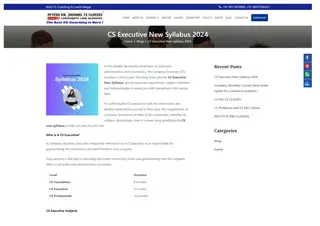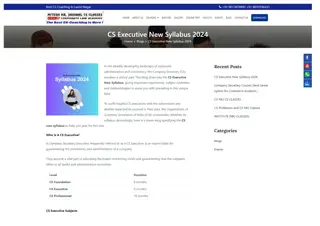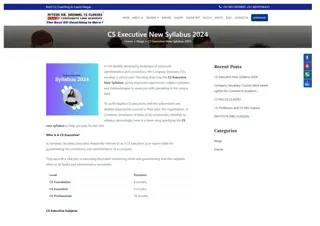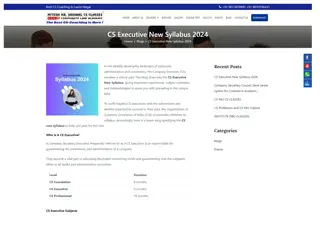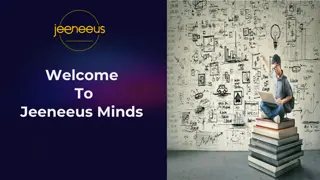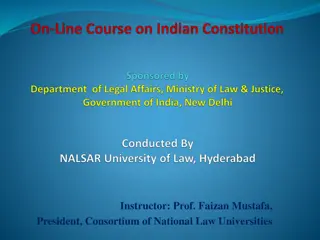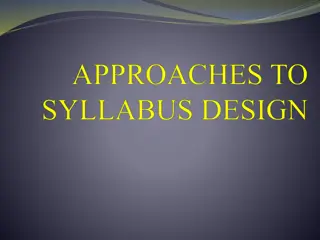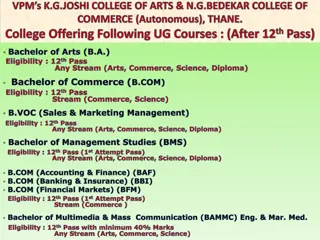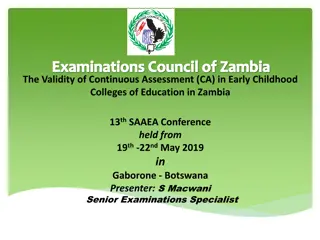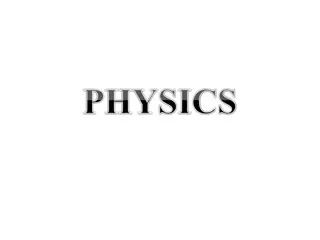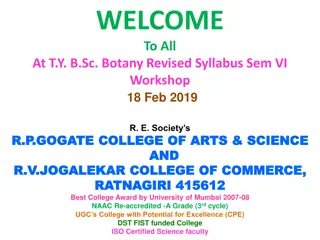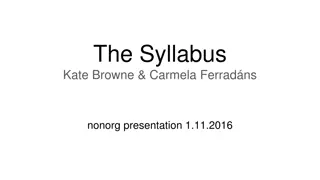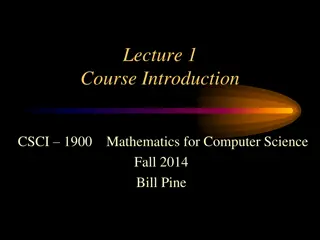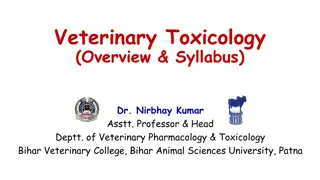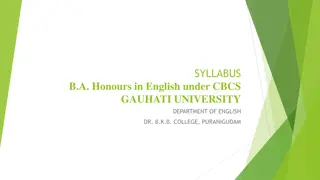Skills Development Course Syllabus at NKTT College, Thane
Explore the comprehensive syllabus of the FC Project Preparation and Presentation Skills course at NKTT College, Thane. Delve into topics like Human Rights Provisions, Environmental Concerns, Science and Technology, and Soft Skills for Effective Communication. Gain insights on dealing with disasters, understanding science in everyday life, and honing leadership skills. Engage in projects and assignments focusing on internal assessment and develop a range of essential skills through various presentation formats.
Download Presentation

Please find below an Image/Link to download the presentation.
The content on the website is provided AS IS for your information and personal use only. It may not be sold, licensed, or shared on other websites without obtaining consent from the author. Download presentation by click this link. If you encounter any issues during the download, it is possible that the publisher has removed the file from their server.
E N D
Presentation Transcript
FC Project Preparation and Presentation skills Dr. Pallavi Shah NKTT College , Thane (W)
Syllabus as per University guidelines F.C-III Module 1 Human Rights Provisions, Violations and Redressal Scheduled Castes- Constitutional and legal rights, Forms of violations, Redressal mechanisms.Scheduled tribes- Constitutional and legal rights, Forms of violations, Redressal mechanisms Women- Constitutional and legal rights, Forms of violations, Redressal mechanisms. Children- Constitutional and legal rights, Forms of violations, Redressal mechanisms. People with Disabilities, Minorities, and the Elderly population- Constitutional and legal rights, Forms of violations, Redressal mechanisms. Module 2 Dealing With Environmental Concerns Concept of Disaster and general effects of Disasters on human life- physical, psychological, economic and social effects. Some locally relevant case studies of environmental disasters. Dealing with Disasters - Factors to be considered in Prevention, Mitigation (Relief and Rehabilitation) and disaster Preparedness. Human Rights issues in addressing disasters- issues related to compensation, equitable and fair distribution of relief and humanitarian approach to resettlement and rehabilitation.
Syllabus as per University guidelines F.C. -III Module 3 Science and Technology I Development of Science- the ancient cultures, the Classical era, the Middle Ages, the Renaissance, the Age of Reason and Enlightenment. Nature of science- its principles and characteristics; Science as empirical, practical, theoretical, validated knowledge. Science and Superstition- the role of science in exploding myths, blind beliefs and prejudices; Science and scientific temper- scientific temper as a fundamental duty of the Indian citizen. Science in everyday life- technology, its meaning and role in development; Interrelation and distinction between science and technology. Module 4 Soft Skills for Effective Interpersonal Communication Part A Effective Listening - Importance and Features. Verbal and Non-Verbal Communication; Public-Speaking and Presentation Skills. Barriers to Effective Communication; Importance of Self-Awareness and Body Language. Part B Formal and Informal Communication - Purpose and Types. Writing Formal Applications, Statement of Purpose (SOP) and Resume. Preparing for Group Discussions, Interviews and Presentations. Part C Leadership Skills and Self-Improvement - Characteristics of Effective Leadership. Styles of Leadership and Team-Building.
Projects / Assignments(for Internal Assessment) Projects/Assignments should be drawn for the component on Internal Assessment from the topics in Module 1 to Module 4. Students should be given a list of possible topics - at least 3 from each Module at the beginning of the semester. The Project/Assignment can take the form of Street-Plays / Power-Point Presentations / Poster Exhibitions and similar other modes of presentation appropriate to the topic. Students can work in groups of not more than 8 per topic. Students must submit a hard / soft copy of the Project / Assignment before appearing for the semester end examination.
Marks Allocation Sr. No. Particulars Marks 01 Project to be prepared by individual learner or group learners in a group. It is to be evaluated by teacher concerned. Hard copy of the project 10 marks 20 marks Presentation 5 marks Viva/Interaction 5 marks 02 Active participation in routine class instruction deliveries and overall conduct as responsible learner, mannerism, and articulation and exhibit of leadership qualities in organizing related academic activities 05 marks
Topics for Project/ Presentation 1. Right to Information Act 2005 2. Report Writing 3. Citizen Charter 4. Violations of Consumers Rights 5. Environmental Principles 6. Sustainable Development 7. Misuse of Technology 8. GPS 9. Information and Communication Technology 10. Time Management 11. Various Technologies in Modern Era 12. Consumer Movement 13. Human Rights Principles of Environment 14. Public Interest Litigation 15. Global Warming and Environmental Effects 16. Case study on any of above
Rules for Project submission Individual project 20 pages Ppt presentation 5 minimum slides Viva by zoom Topics will be given to all
Project Instructions In word document Font size 12 and heading 14 Spacing 1.5 Page number is essential Header and footer can be added Margin 1.5 left side other 3 sides 1 Font type : Times new Roman First Page Name. Class , Division , Roll no, year, Name of the Topic
Guidance for project preparation Index Introduction History Current information Problems / challenges Statistical analysis Case study Finding Suggestions and recommendations Bibliography and Wibliography
Presentation guidance Each students will get 5 min Minimum 5 slides Introduction Study Problems or challenges Finding Suggestions Reference
Quick guide for effective presentation Welcome note Say loud Be confident Smile Add case/ Pictures With less info speak more Don t know , don t ans Thank you note







